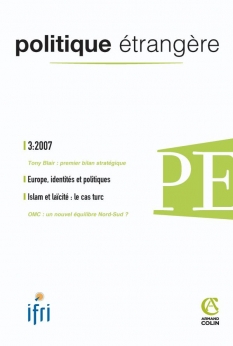
Politique étrangère n° 3/2007
Pour acheter ce numéro, contactez-nous
Recevez les numéros de l'année en cours et accédez à l'intégralité des articles en ligne.
La participation aux actions des institutions internationales (opérations de maintien de la paix de l’ONU, partenariats avec l’OTAN...) est un vecteur essentiel de démocratisation des relations civilo-militaires. Mais, comme le démontre le cas du Maroc, c’est l’existence d’une structure démocratique interne qui reste déterminante pour assurer un véritable contrôle civil, et une réelle prise en charge des problèmes militaires par la société civile et politique.
This article examines the extent to which Albert Legault’s democratic model of civil-military relations is applicable to Morocco through the action of international institutions as a vehicle for democratization. It does not deny the role of those institutions in triggering the current transition to democracy, but assumes that their role was less effective with regard to democratic control of the armed forces. The article proposes that such control presupposes a democratic governmental structure, a true multiparty system, media freedom and respect of human rights. As solid and irreversible democratization takes hold in Morocco, it will be seen as necessary to establish a democratic civil-military relations model and thus confine the army to its traditional role in a democratic society.